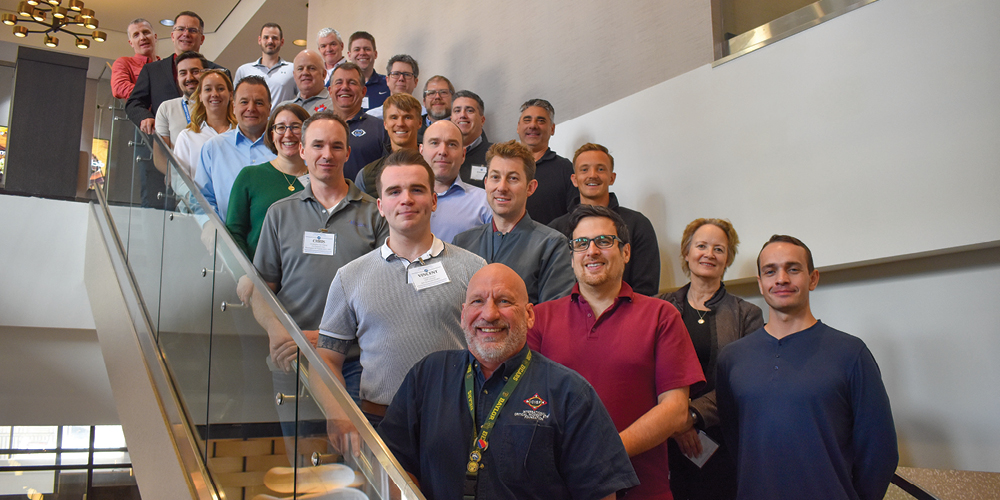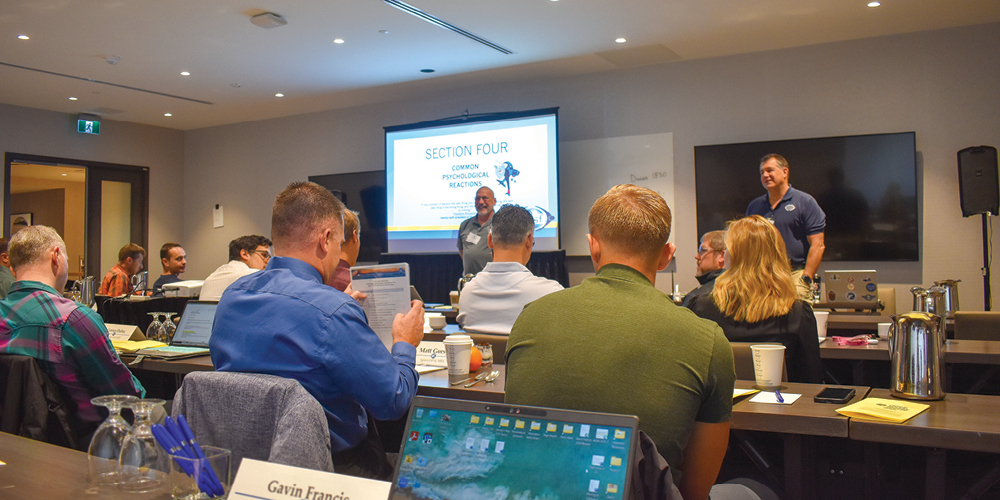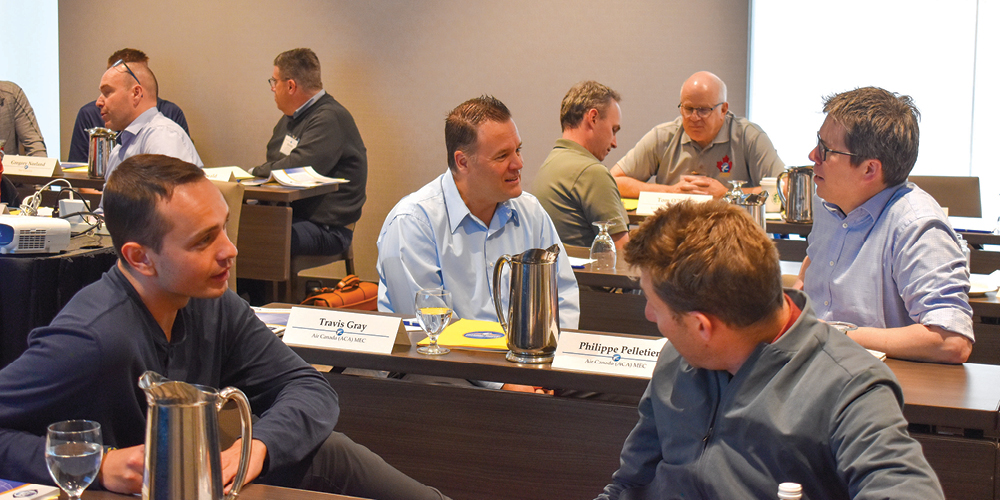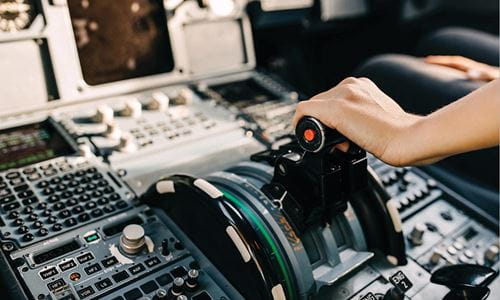
Taking Care of ALPA’s Own
Pilots Complete CIRP Training in Calgary

ALPA’s Air Safety Organization (ASO) Critical Incident Response Program (CIRP) conducted training in Calgary, Alb., on April 1–3 that included a three-day Group and Individual Crisis Intervention (GRIN) Course. The training, designed to prepare participants to serve as peer volunteers in the Association’s CIRP network, is part of ALPA’s ongoing efforts to support pilot wellness and enhance the Association’s ability to respond effectively to critical incidents.
Those who’ve completed the course are fully qualified CIRP peers, ready to offer support to fellow pilots who’ve experienced a critical event while at work. The Calgary training event also included CIRP recurrent training, which ran concurrently for returning volunteers looking to refresh and expand their skills. Participants included 27 pilots from 12 ALPA pilot groups across Canada and the United States and two chief pilots from two Canadian airlines.
Capt. John McFadden (United), the CIRP Committee chair and lead instructor, facilitated classroom discussions and training exercises along with F/O Lee Keller (Air Canada), ALPA’s Pilot Assistance Canada CIRP coordinator, and Mark Berg, a mental-health consultant who formerly served as director of the Employee Assistance Program at the MD Anderson Cancer Center and currently assists in the clinical direction for the program. The instructor group brings decades of experience and diverse perspectives to this very specialized pilot assistance training.

ALPA’s CIRP traces its roots back to the traumatic 1988 events surrounding Aloha Airlines Flight 243. When a 20-foot section of fuselage tore away from the B-737 at altitude, the pilots were able to land the damaged aircraft; but 65 passengers and crewmembers were injured, and a flight attendant, who was swept overboard from the aircraft, died. Capt. Madeline “Mimi” Tompkins (Hawaiian, Ret.), who served as a first officer on that flight with Capt. Robert Schornstheimer (Aloha, Ret.), struggled for years afterward with flashbacks, sleeplessness, and emotional strain. Her experience navigating those challenges—combined with the lack of a peer support structure at the time—ultimately led to the creation of ALPA’s CIRP.
ALPA began teaching its first class of peer support volunteers in September 1994. One month later, Simmons Flight 4184 crashed, killing all 68 people aboard. CIRP volunteers were called in to debrief accident investigators who had worked at the crash site.
Since then, CIRP has evolved into a structured peer support model based on science-backed methodologies developed by the International Critical Incident Stress Foundation (ICISF). The goal is to provide immediate, confidential, peer-to-peer contact with a fellow pilot who’s been trained to listen, empathize, and guide a structured conversation that helps process the emotional aftershocks of a critical event.
“I think the program continues to develop; and as it does, it becomes even more collaborative and cooperative among those doing this work,” said
McFadden, who’s been an ALPA CIRP volunteer for more than two decades.
And the concept is spreading. Critical incident support programs are gaining acceptance in other countries with airlines like Lufthansa developing similar resources for its employees.
“When the idea expanded to the United Nations and the World Health Organization, that’s where it really caught on,” said Berg. “You can take this same exact class in another country. It’s taught in a different language, but the process and the information are all the same.”
Whenever an accident or incident occurs, CIRP-trained volunteers are mobilized—often within hours. They typically respond in two ways: one team stays with ALPA’s accident investigators and provides nightly check-ins with them at their hotel; another is deployed to bases, pilot lounges, or offices where other affected crewmembers may be located. This twofold approach ensures that no pilot is left to process trauma alone.
The conversations are confidential and voluntary. No notes are taken, participation has no bearing on disciplinary proceedings, and rank is left at the door. The interaction with a CIRP peer isn’t a therapy session, but rather a structured, empathetic dialogue with no other goal than to provide support and make that person aware of the resources available to them.
Pilots often internalize stress, especially in a profession where strength, competence, and control are essential. CIRP helps counter that isolation by creating space for authentic conversations. Data supports the value of CIRP as well. Pilots who engage with a CIRP volunteer are statistically more likely to remain in the profession following a traumatic event and less likely to develop symptoms of posttraumatic stress disorder.
Several recent accidents where peer support has proved critical have underscored the importance of the program. CIRP volunteers mobilized in response to the January 29 mid-air collision involving PSA Flight 5342 and a U.S. Army Black Hawk helicopter over the Potomac River while on approach to Washington National Airport. Capt. Chris Sabia (PSA), his pilot group’s Master Executive Council vice chair, called in during the training event to speak to participants about how important the program has been to PSA pilots in helping those affected process the tragedy.
“Within four hours of getting news of the accident, there were a lot of things that took place behind the scenes,” said Sabia, who’s a trained CIRP peer. “By the time we got to D.C. the next morning, John and his team were already in place. And when we walked into the room to meet the families and explain to them what we do and how we do it, it was gratifying to see that the families understood that they weren’t going through this situation alone. That was an indication of how well the program works. Not only were we able to help our pilots and flight attendants, but we were also able to reach out and help the families.”
Sabia expressed strong support for the training he and others received through ALPA’s CIRP. “It’s been invaluable to us in dealing with the situation. John and Mark, and all the CIRP instructors, have given us the tools we need to help our members who’ve been affected. It’s really been amazing to see how well the training works.”
CIRP peers also provided assistance following the February 17 accident involving Endeavor Air Flight 4819 at Toronto Pearson International Airport, when the aircraft overturned on the runway during landing. In both cases, CIRP peers quickly reached out to those affected, offering confidential support. These recent events demonstrate that the program remains an important resource for ALPA members during tragic circumstances and moments of great need.
“The investigative processes of the two accidents earlier this year are different,” said McFadden, “but the human aspect of CIRP response to support the pilots is the same regardless of which side of the border a pilot lives.”
The Calgary training event brought together a mix of new and returning volunteers. New participants completed the ICISF-certified GRIN Course, which emphasizes both group and individual intervention skills. Recurrent volunteers refreshed their understanding of intervention protocols and participated in scenario-based discussions and role-play exercises—testing their ability to respond in emotionally nuanced ways under pressure.

Keller helped lead the training discussions, offering insight from his experience coordinating CIRP in Canada. ALPA’s CIRP is truly a binational program, adapted to the legal and cultural contexts of both U.S. and Canadian aviation, but united by a single mission: pilot-to-pilot care.
The training in Calgary also marked continued efforts to expand CIRP’s reach and preparedness. The inclusion of chief pilots in the training event shows growing management buy-in.
Rooted in real-world experience and informed by science, CIRP is carried forward by the compassion and commitment of pilots who dedicate their time to supporting their peers. Whether responding to a high-profile accident or a quiet moment of emotional stress, CIRP volunteers show up—not as therapists, but as fellow aviators who understand what it means to face on-the-job challenges.
Pilots Supporting Pilots
No one should have to face a critical incident alone. If you’ve been impacted by an accident or incident, reach out to your pilot group’s Critical Incident Response Program (CIRP) Committee. CIRP volunteers are ready to assist.
This article was originally published in the May 2025 issue of Air Line Pilot.












